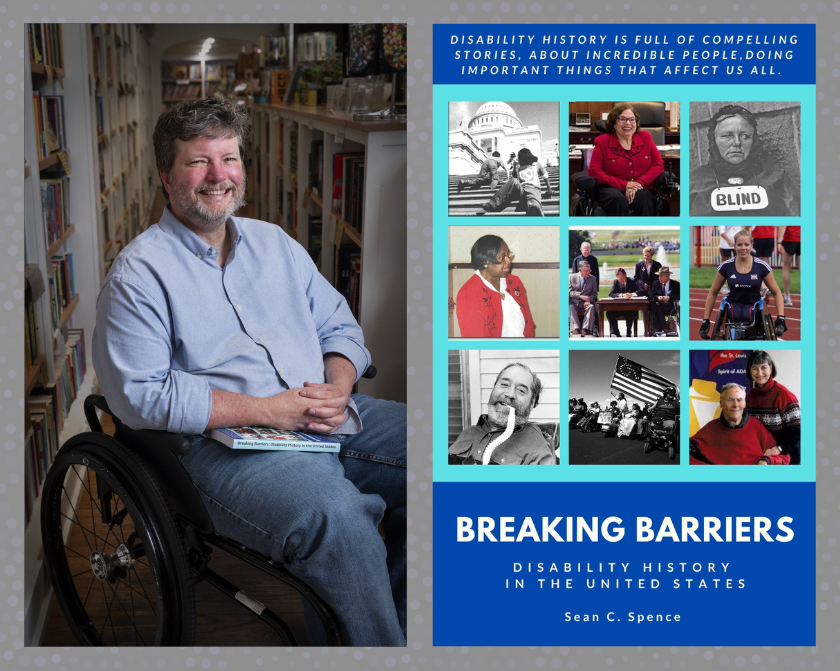Sean Spence is a Columbia, MO author whose latest book is “Breaking Barriers: Disability History in the United States.” The book covers key individuals, events and concepts that have affected the history of disability rights in the United States. Spence’s interest in disability starts primarily with his personal experience as someone with multiple sclerosis, combined with his love of history (he earned his BA in US history from MU in 1993). He currently works on fundraising, PR & marketing, and volunteer management for the Salvation Army. He was kind enough to take the time to be interviewed via email.
Daniel Boone Regional Library: If you could go back in time and witness an event related to disability history, which one would you pick?
Sean Spence: One of the pivotal – and most exciting/emotional – moments leading up to the passage of the Americans with Disabilities Act (ADA) was the Capitol Crawl on March 12th, 1990. It was just before passage and it really looked like the ADA might not pass at all; it had gotten kind of bogged down in the US Senate and many of our best activists thought it was not going to happen.
In a brilliant, made-for-TV move, activists organized a day for people from disabilities from all over the country met at the United States Capitol, threw aside their wheelchairs and other assistive equipment, and began crawling up the 83 stone steps, putting on dramatic display the hardships posed by so many of our nation’s inaccessible buildings. One of the youngest participants was an 8-year-old girl, who left her wheelchair and pulled herself up those 83 steps.
As one might expect, this event caught the attention of the media, legislators, activists, and so many others, and played an integral role in final passage of the ADA.
DBRL: This book took you eight years of writing off and on to complete. Can you explain a little about the process of creating this book? What was the hardest part of the process for you?
Spence: Writing is hard! Something over 90% of the people who start writing a book do not finish. If I did not know that, it is entirely possible that I would never have finished. I absolutely did not want to be a quitter.
The book actually started as a biography of Justin Dart, Jr., (basically the MLK of the disability rights movement, without whom the ADA definitely would not have passed). I started writing and had something I really liked, but there is just not enough information out there about Justin to do a full biography (at least with my limited abilities). That led me to set it aside, and over the years it nagged at me until I went back to it, and then it evolved and I would set it aside again, and then go back to it again. Finally, I had most of it and I set a six month deadline to edit it and got it done.
DBRL: Do you have any suggestions how teachers could integrate disability history into their curriculum?
Spence: At the very least, disability history should definitely be an elective in the same way that we have women’s history, African American history, and so many others. Beyond that, it would be pretty easy to add a chapter or two to every K-12 American history book, and to talk about it alongside pretty much everything else.
DBRL: For you, what are the most important issues today in the world of disability? You asked this question to some people you interviewed for the book, but I’m curious about your answer.
Spence: I am scared to death of the U.S. Supreme Court. In the same way that they struck down Roe v. Wade, there are many who believe the ADA will soon be on the chopping block. If we lose the ADA, the whole idea of people with disabilities living independent lives will be threatened.
DBRL: You have a section called “10 books you should read about disability.” Are there one or two from that list you’d recommend the most?
Spence: Definitely:
- “Why I Burned My Book and Other Essays on Disability,” Paul Longmore (2003)
- “No Pity: People with Disabilities Forging a New Civil Rights Movement,” Joseph Shapito (1994)
DBRL: Where can readers get a copy of your book?
Spence: It is in the Columbia Public Library and on Amazon (just search “Breaking Barriers Sean Spence” and you will go right to it!).



